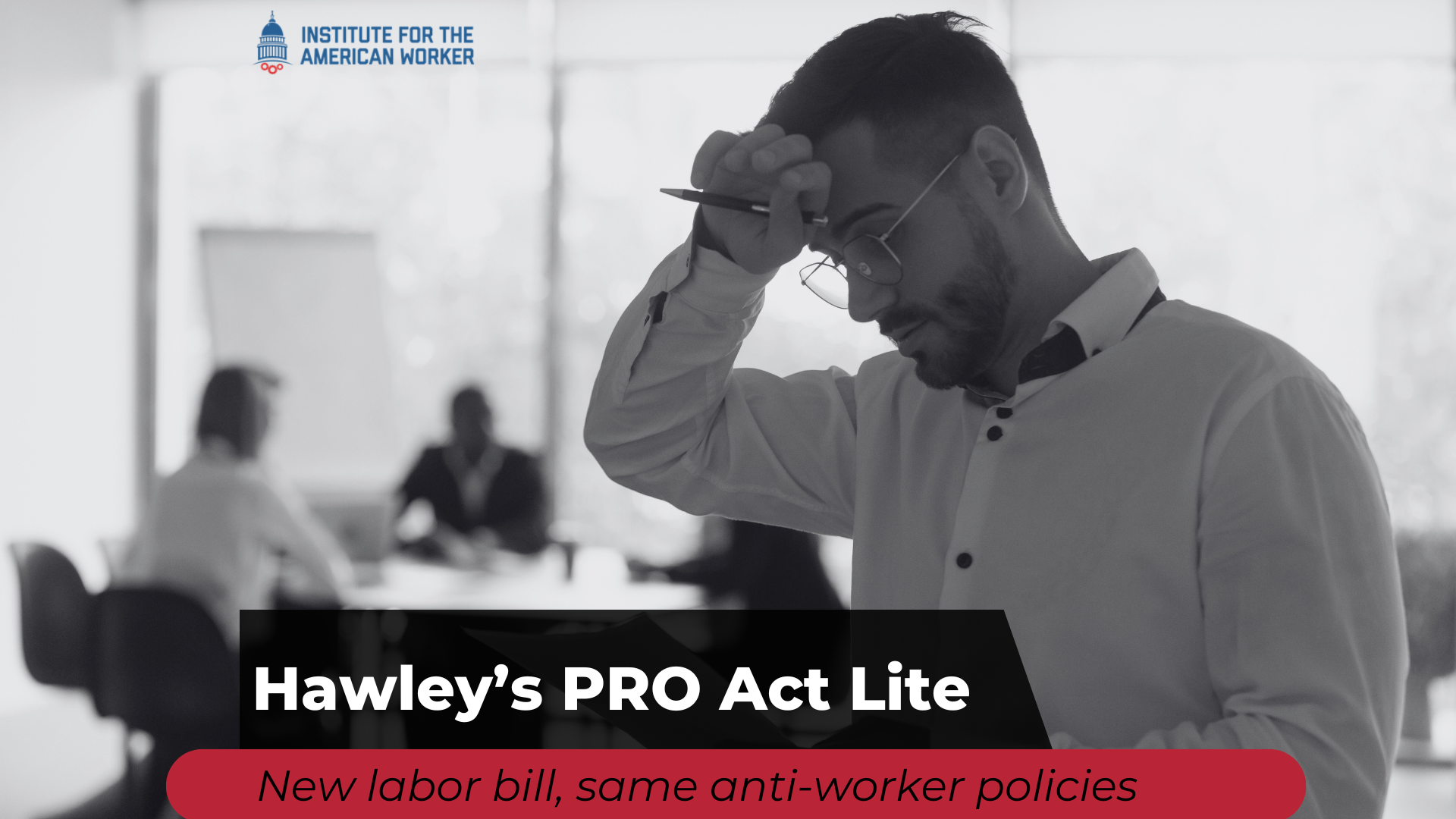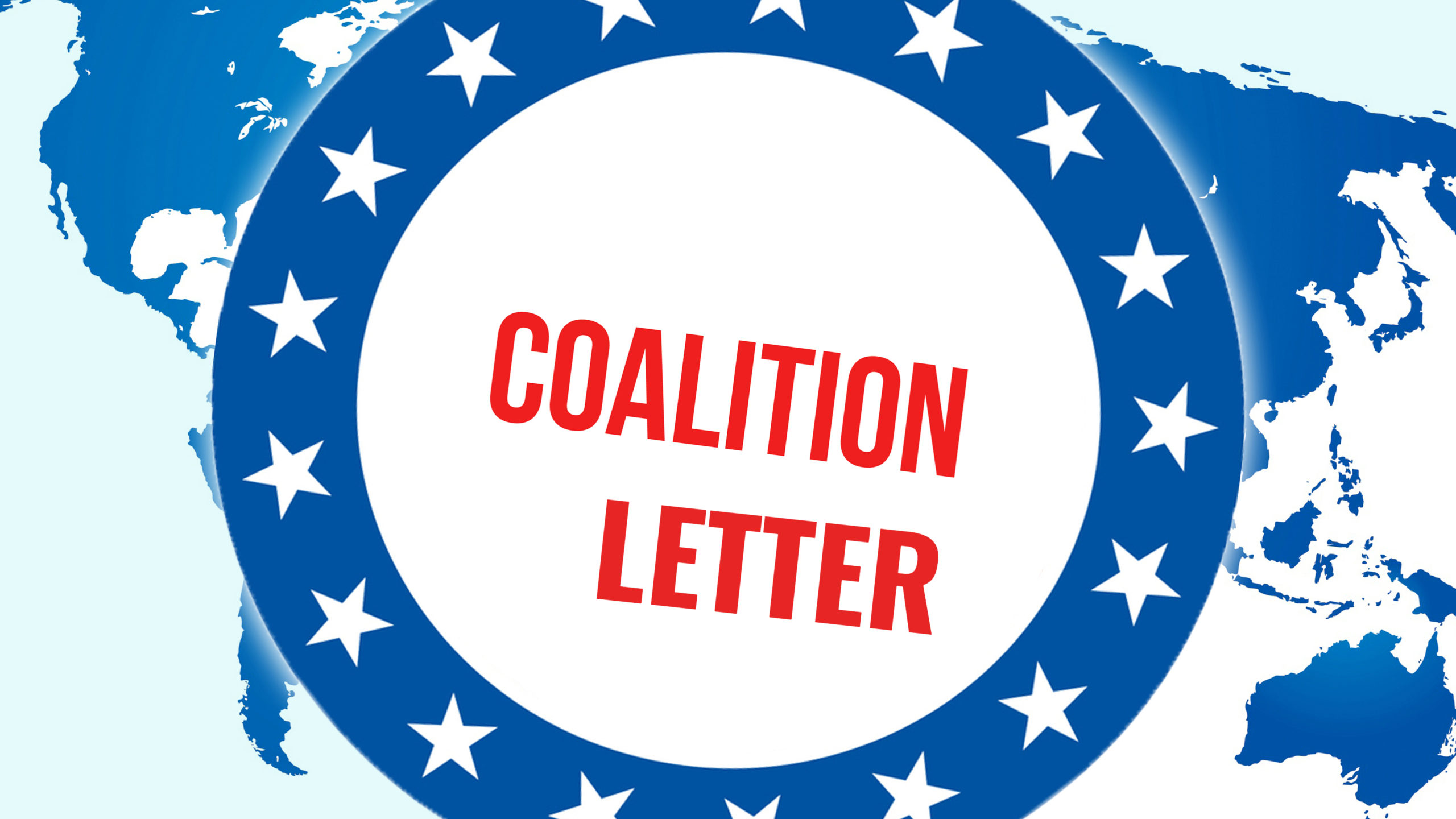Posts tagged Institute for the American Worker

Vinnie Vernuccio Commentary: Trump can stop unions from tricking workers
May 4, 2025 // Unions won’t be open and transparent on their own, so Congress must step up. The SALT Act requires unions to file detailed public reports within 30 days of hiring a salt — the exact same thing that businesses have to do when they hire labor consultants. Workers deserve the transparency, accountability, and honesty that help them make a fully informed decision about whether unionization is right for them. And Trump can work with Congress to give workers this long-overdue power.

LETTER: Congress must reject proposed job-killing labor legislation
April 20, 2025 // However, a new threat to Kansas business owners has emerged in the form of a legislative framework that the Institute for the American Worker has dubbed the “PRO Act Lite,” modeled after the failed policies of Senator Bernie Sanders and other progressive lawmakers. While it may come with a new label, the substance remains the same. This proposal would drive up labor costs, stifle economic opportunity, and make it significantly harder for employers to create jobs.

Coalition Letter: Protecting Taxpayers’ Wallets Act
April 16, 2025 // Prior to the recent termination of collective bargaining rights for Transportation Security Administration (TSA) officers, the Department of Homeland Security revealed that nearly 200 TSA officers were working full-time on union matters despite being paid salaries by the government. In FY2019, the most recent year for which the data is available, over 550 employees at the Internal Revenue Service (IRS) were paid taxpayer dollars to perform union work. In another case, a union president has been allowed to occupy an executive suite that spans half of a hospital wing at the Salem VA Medical Center at taxpayer expense. Members of Congress recently introduced legislation to rectify this problem and prevent further squandering of tax dollars. The “Protecting Taxpayers’ Wallets Act of 2025,” introduced as H.R. 1210 by Congressman Scott Perry (R-Pa.) and S. 511 by Senator Joni Ernst (R-Iowa), would give agencies the power to charge labor unions for their use of official time and their use of any agency resources such as office space and equipment.
Mackinac Center Joins Amicus Brief Challenging Private Delegation of Government Regulatory Authority
February 13, 2025 // The amicus brief, filed alongside the Institute for the American Worker and the Pelican Institute for Public Policy, argues that delegating regulatory power to private industry groups violates the nondelegation doctrine and due process protections. The case before the Supreme Court challenges the FCC’s reliance on the Universal Service Administrative Company, a private, industry-run entity, to set and administer fees collected from telecommunications companies. These fees are ultimately passed on to consumers. The Fifth Circuit Court of Appeals found this structure unconstitutional, ruling that it improperly allows private entities to exercise government power.
Report Shows Extent of Tax Dollars Spent on Public-Sector Unionism
January 17, 2025 // The results of the 2024 presidential election were a repudiation of Biden’s “most pro-union administration in American history,” in favor of one that sides with actual workers, as opposed to union bosses. Congress has every right to demand oversight over the expenses of the executive branch, especially when taxpayer dollars are funneled to union bureaucrats that are working in the interests of themselves and not the American people.
(I4AW) Report Shows Extent of Tax Dollars Spent on Public-Sector Unionism
January 17, 2025 // After the last official report was compiled in 2019, the OPM stopped reporting the hours and costs involved in union-related “official time” despite repeated calls from House Education and Workforce Committee Chairwoman Virginia Foxx for President Trump’s 2018 Executive Order to be honored. Pushback continued in 2023 when Sen. Marsha Blackburn (R-Tenn.) directed a letter to the OPM querying why the website reporting page went missing in July of that year, only to be told the site was undergoing “maintenance”. In March of last year, Sen. Joni Ernst (R-Iowa) introduced legislation entitled the Taxpayer-Funded Union Time Transparency Act which called on a return to reporting on the part of the OPM regarding time spent on collective bargaining. In August, Sen. Mike Lee (R-Utah) introduced a bill entitled the No Union Time on the Taxpayer’s Dime Act to curtail union activities by federal employees during work hours. All these attempts to increase transparency for taxpayers were roadblocked by Democrats in Congress and even now, the site still has not re-emerged – making I4AW’s report even more critical.
Ranking Member Cassidy Introduces Legislation Preventing Unions from Abusing Workers’ Dues to Promote Antisemitism, Hateful Ideology
October 4, 2024 // “At a time when major unions are blatantly disregarding the opinions and interests of their members, I applaud Senator Cassidy for introducing legislation that will ensure workers know their union rights and enhance them,” said F. Vincent Vernuccio, President, Institute for the American Worker.

Free-Market Groups Back Bill to Protect Taxpayers from Union Abuse
September 18, 2024 // H.R. 9594 was introduced by Congressman Scott Perry (R-Pa.) and swiftly referred to the House Oversight Committee. The bill would allow federal agencies to charge public-sector labor unions for the employee hours and agency resources which are used on activities that serve those unions. Currently, federal employees who are union members can spend their on-the-clock hours working for a union instead of doing their jobs, while still being paid their taxpayer-funded salaries. The unions also use government facilities and resources to conduct their work at taxpayer expense. H.R. 9594 would recover these wasted taxpayer funds
Op-Ed: Labor unions are turning into roach motels for generations of workers
September 17, 2024 // So, if you're stuck in a union, the odds are you probably didn't vote for that union to be there -- someone employed by the company years ago voted for them based on different circumstances, but you have to live with the consequences as an employee of a company with a union stuck onto them like a barnacle. Only five percent of workers throughout the entire private sector voted for the union that supposedly represents them. Everyone else is their hostage, paying the extorted union dues whether they like or not, as a sort of ransom, yet never, ever, getting released.

OPINION Why don’t unions have to stand for reelection?
September 16, 2024 // The federal Bureau of Labor Statistics reports that 7.4 million workers in the private sector belonged to labor unions in 2023. Yet according to a new study from the Institute for the American Worker, which promotes market-oriented labor reform, fewer than 400,000 of those unionized employees — about 5 percent — have ever voted in an election for the union that represents them. Like me, the vast majority of employees in unionized workplaces were hired after the union had already been voted in. Most unions have never been required to confirm that they have the support of current workers by winning a recertification election. In some workplaces, a lifetime has elapsed — that isn’t hyperbole — since the union was first certified. The United Auto Workers organized General Motors’ Michigan plants in 1937 and has represented the employees who work there ever since. Never once has it had to stand for reelection. What kind of “workplace democracy” is that?
